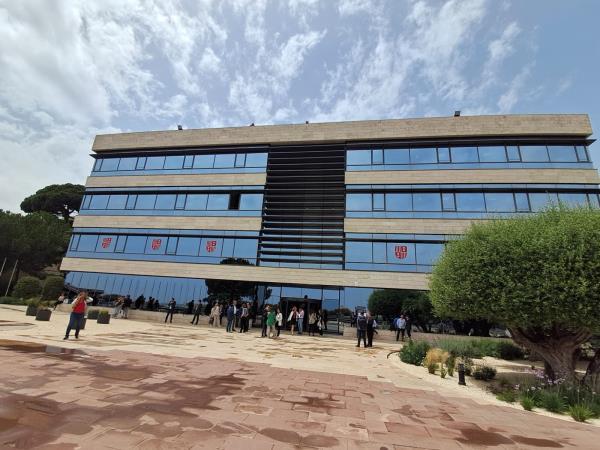IN-DEPTH analysis: how to orchestrate sustainability and competitiveness
PE
How to improve sustainability and competitiveness together, how to build a strong sustainable brand value, were among the most focused panel discussions at the 27th edition of the "IESE Food and Beverage Meeting", organised on 20 June at IESE's headquarters in Barcelona. Indeed an avalanche of European and national measures increases the cost and makes it difficult to achieve the double objective of being more profitable and sustainable at the same time. On the other hand it gives the opportunity to create strong sustainable brands. The conference was supported by Deloitte, CaixaBrank and Bühler Group. It brought together a record number of almost 450 top executives from major Spanish and multinational food compagnies, compared to 320 leaders in 2023. "We are convinced that creating spaces for joint learning strengthens, inspires and elevates any sector," wrote its main coordinator Miquel Lladó, professor of strategic management and senior lecturer at IESE Business School. The meeting is made up of an advisory board of 30 CEOs from the food sector.
Regulatory symphony: orchestrating sustainability and competitiveness
Is it possible to design regulatory policies supporte innovation and the adoption of sustainable practices? Which strategies can companies adopt to transform the challenges companies face in trying to comply with regulations into competitive opportunities? Are there measurement and control mechanisms to measure these objectives? The guests on the panel to answer the questions were Mauricio García de Quevedo, Director General of FIAB; Felipe Medina, Technical Secretary General of ASEDAS; Nuria De Pedraza, Director of Communication, Institutional Relations and Public Affairs of AECOC; Javier Solans, Vice-President of Ecoembes.
Environmental standards continue to multiply
Faced with the avalanche of European and national environmental measures that rather generate costs, it is up to each company to resolve the dilemma and find solutions to continue growing while being competitive and more sustainable at the same time. Felipe Medina, the technical secretary general of ASEDAS, the Spanish association of distributors, self-service stores and supermarkets, clarified that his organisation has the same position as the industrial sector. "Opening a fruit and vegetable shop requires to comply with 3,000 standards, both in terms of the environment, urban planning, food safety and sustainability," warns Felipe. And more standards are to come in the future. He warns of the danger of "delegated acts" in the European Parliament, which usually bring together a few people to take decisions when neither the Commission nor the Parliament agree on an issue, after a process of debate. "Already this year there have been some 600 delegated acts planned to adopt rules in the sustainability field," says Felipe. He also doubts the veracity of the Commission's impact assessment of new measures, after a large number of new regulations and changes to them.
Difficult balance between sustainability and competitiveness
According to Nuria De Pedraza of AECOC, the balance between sustainability and competitiveness is not an easy one. The two are inseparable, considering consumer demand for a more sustainable supply and the needs of the planet to reduce impact. "Surveys show that 75% of Spaniards believe it is necessary to rethink our economic model," reports Nuria. She warns that in a global context, regulatory risk may take precedence over cybersecurity risk. She regrets that environmental aspects are being regulated politically rather than technically, in a context in which companies are also competing with third countries that have other types of rules. Given the environmental urgency and the public's need to stay in good health, would it not be better for the regulator to anticipate this demand with new regulations, rather than the politician to wait and regulate when appear a real demand of the population?
Being more sustainable will help to be more competitive
For Javier Solans of Ecoembes, the non-profit organisation that manages packaging and paper waste in Spain (blue and yellow containers), there is no other option but to bring competitiveness and sustainability together. "In the future there is no doubt that you have to be sustainable to be competitive, otherwise the market will penalise you”. Javier highlighted that the whole world is moving in the same direction, even in countries such as China, where 50% of the world's electric cars are sold, the environmental issue is more advanced domestically and with at export level with a leading industry. According to Javier, one of the challenges or opportunities for companies is how to help consumers to be more sustainable, given that 80% say they want to be more sustainable but only 10% of them actually do something for it.
Europe must play a more ambitious role on the world stage
For Mauricio García de Quevedo of FIAB, Europe should be much more of a leader in the ecological transition on the world stage, and be more ambitious on an economic level. China understood the opportunity of the ecological transition and today dominates the world's production of solar panels, batteries and electric vehicles. For Felipe Medina of Asedas, companies are willing to do everything possible to be part of the green transition and to respond to new regulations such as the entry into force of recycling and the obligation of reporting as of 01 January 2025. He regrets the delay of the national administrative framework for the implementation of some new standards.





